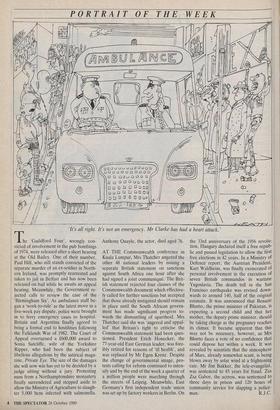PORTRAIT OF THE WEEK
`It's all right. It's not an emergency. Mr Clarke has had a heart attack.' The 'Guildford Four', wrongly con- victed of involvement in the pub bombings of 1974, were released after a short hearing at the Old Bailey. One of their number, Paul Hill, who still stands convicted of the separate murder of an ex-soldier in North- ern Ireland, was promptly rearrested and taken to jail in Belfast and has now been released on bail while he awaits an appeal hearing. Meanwhile, the Government re- jected calls to review the case of the `Birmingham Six'. As ambulance staff be- gan a 'work-to-rule' as the latest move in a five-week pay dispute, police were brought in to ferry emergency cases to hospital. Britain and Argentina finally agreed to bring a formal end to hostilities following the Falklands War of 1982. The Court of Appeal overturned a £600,000 award to Sonia Sutcliffe, wife of the 'Yorkshire Ripper, who had been the subject of libellous allegations by the satirical maga- zine, Private Eye. The size of the damages she will now win has yet to be decided by a judge sitting without a jury. Protesting nuns from a Northamptonshire monastery finally surrendered and stepped aside to allow the Ministry of Agriculture to slaugh- ter 5,000 hens infected with salmonella.
Anthony Quayle, the actor, died aged 76.
AT THE Commonwealth conference in Kuala Lumpur, Mrs Thatcher angered the other 48 national leaders by issuing a separate British statement on sanctions against South Africa one hour after she had signed a joint communique. The Brit- ish statement rejected four clauses of the Commonwealth document which effective- ly called for further sanctions but accepted that those already instigated should remain in place until the South African govern- ment has made significant progress to- wards the dismantling of apartheid. Mrs Thatcher said she was 'angered and appal- led' that Britain's right to criticise the Commonwealth statement had been ques- tioned. President Erich Honecker, the 77-year-old East German leader, was forc- ibly retired for reasons of 'ill health', and was replaced by Mr Egon Krenz. Despite the change of governmental image, pro- tests calling for reform continued to inten- sify and by the end of the week a quarter of a million people were marching through the streets of Leipzig. Meanwhile, East Germany's first independent trade union was set up by factory workers in Berlin. On the 33rd anniversary of the 1956 revolu-. tion, Hungary declared itself a free repub- lic and passed legislation to allow the first free elections in 42 years. In a Ministry of Defence report, the Austrian President, Kurt Waldheim, was finally exonerated of personal involvement in the execution of seven British commandos in wartime Yugoslavia. The death toll in the San Francisco earthquake was revised down- wards to around 140, half of the original estimate. It was announced that Benazir Bhutto, the prime minister of Pakistan, is expecting a second child and that her mother, the deputy prime minister, should be taking charge as the pregnancy reaches its climax. It became apparent that this may not be necessary, however, as Mrs Bhutto faces a vote of no confidence that could depose her within a week. It was revealed by scientists that the atmosphere of Mars, already somewhat scant, is being blown away by solar wind at a frightening rate. Mr Jim Bakker, the tele-evangelist, was sentenced to 45 years for fraud. Zsa Zsa Gabor, the actress, was sentenced to three days in prison and 120 hours of community service for slapping a police-


































































 Previous page
Previous page